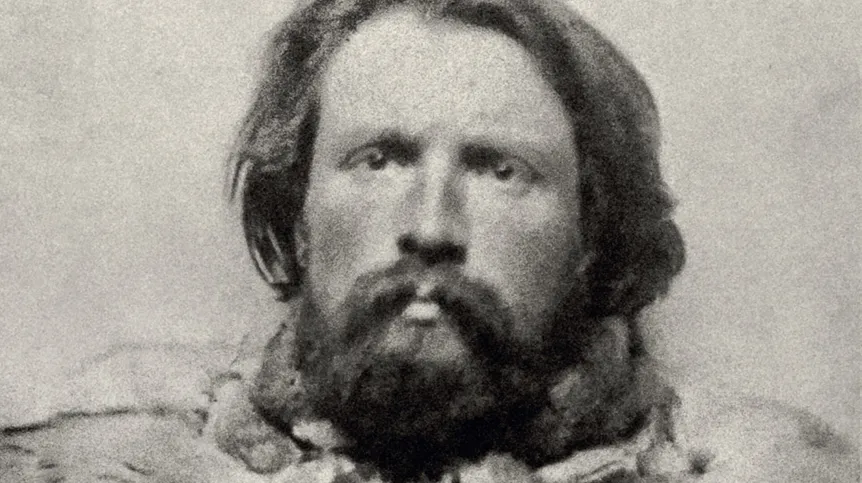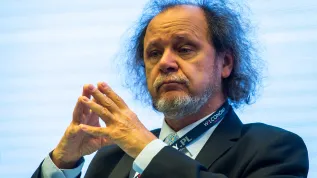
A scientist to the core, a traveller, an explorer, an activist, a dreamer, an idealist - this is how Henryk Arctowski is described by Dagmara Bożek and Katarzyna Dąbkowska in "Henryk Arctowski. In a World of Thoughts", the first full biography of this pioneer of Polish polar research.
'This is the first book devoted to the life and work of Henryk Arctowski (1871-1958). It is not a collection of scientific and conference publications, but a colourful story about reconstructing Henryk's biography based on things no one knew about him before', say the book’s authors Dagmara Bożek and Katarzyna Dąbkowska.
Arctowski was a geophysicist and geographer and one of the first two Poles (along with Antoni Bolesław Dobrowolski) to reach Antarctica in the late 19th century. At the time, and only 26 years old, he took over as scientific director of a Belgian expedition on the ship 'Belgica', considered a breakthrough in the history of Antarctic expeditions (the participants of this expedition were the first people to spend winter in Antarctica, albeit in unfavourable conditions, because the ship was stuck in the ice for 13 months). Arctowski's Antarctic research is the foundation of modern polar research. Today, the Polish Antarctic Station the one on King George Island is named in his honour.
A lesser-known thread the biographers described was his activity for Polish science and Polish scientists during and immediately after World War II.
'In August 1939, Arctowski and his wife Jane went to Washington for a scientific conference. The war broke out while he was there, and with it any prospects of returning home to Lviv and working at the University of Lviv disappeared. That is why he became involved in the work on rebuilding and supporting Polish science by conducting diplomatic activities, but also, for example, acquiring and sending scientific books to Polish institutions and helping Polish scientists when, like him, they found themselves outside the country with no possibility of returning', Dagmara Bożek told PAP - Science in Poland.
She added that Arctowski had already been a 'scientific diplomat' involved in representing Poland at the conference in Versailles (the peace conference that ended World War I).
Another thread that had not been touched on before was his relationship with his sister. 'The very fact that Henryk had a sister was a great surprise to us, because there had been no information about her before; it was even believed that Henryk was an only child who died without descendants. And then suddenly we come across a letter to Henryk in the archives, that begins with the words: dear little brother', Bożek said.
In addition, the unique materials in the book include: a partially reconstructed family tree of Henryk Arctowski's family, previously unpublished photographs from different periods of his life (courtesy of his living relatives), as well as fragments of Arctowski's memories from the 'Belgika' expedition, published in Polish for the first time.
Other interesting materials include graphological expert opinions on Henryk Arctowski's handwriting. 'As a biographer of great people, I am primarily interested in the man hidden behind the facade of honourable distinctions and titles. That is why we reached for this rather interesting procedure and gave Henryk's letters from different periods of his life to a graphologist - from the period when Henryk was about 30 and when he was already over 50, so that she could try to determine his personality. The analyses of his handwriting match what can be seen in his letters and diaries. For example, that he was very expressive and that he had big mood swings - one day he could be in a depressive mood and reproach himself and the whole world for nothing making sense. And in the following days he would fall into a frenzy of work and for several days he would sit and write or analyse', the author said.
Referring to the title of the book: Henryk Arctowski. In a World of Thoughts Bożek explained that it was a quote from his diary, written in the years 1901-1909: 'However, I would welcome hours, entire days of peaceful confinement and I would like to live in the world of thoughts, completely detached from the world around me'.
'The phrase +to be in the world of thoughts+ was a leitmotif of his life, often returning in his diaries. They show that Henryk was indeed an introvert, very focused on his work. This image also emerges from the memories passed on by his family', Bożek said.
'Arctowski was a dreamer. He was not afraid to aim high and put his visions and projects into words and concrete actions. He was an idealist type, often emphasising the utilitarian nature of science, which he believed in until the end of his life. On the other hand, he was also a malcontent, criticising others. In our opinion, Henryk was difficult in social contacts - at least at the first meeting, because later, with time, with deeper acquaintance, he would win people over. He would fit into the stereotype of a genius - a socially difficult person, somehow living in his own mental and intellectual world,’ Bożek said.
The idea for the 500-page book, published by Wydawnictwo BOSZ, was born in 2018 when Katarzyna Dąbkowska decided to make a documentary about Arctowski.
PAP - Science in Poland, Agnieszka Kliks-Pudlik
akp/ kap/
tr. RL













